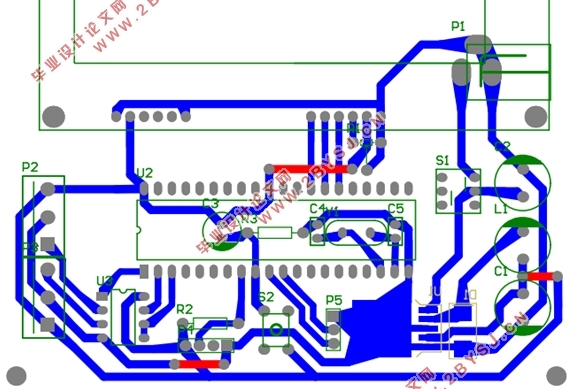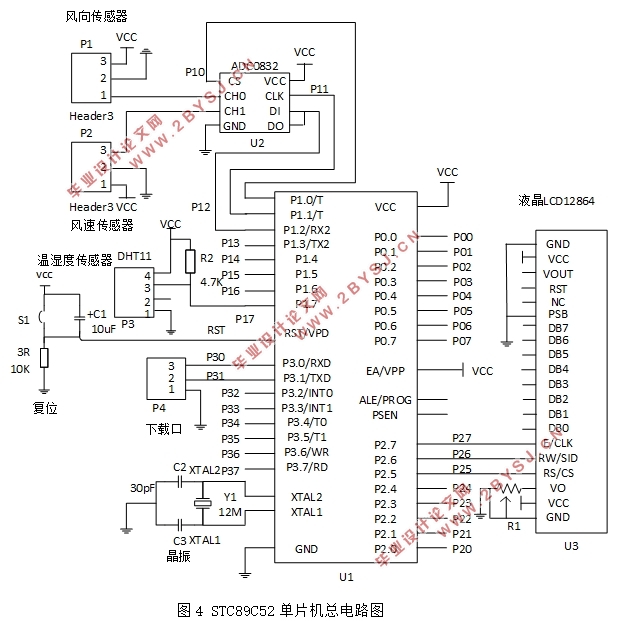基于STC89C52单片机的多要素气象检测系统设计
无需注册登录,支付后按照提示操作即可获取该资料.
基于STC89C52单片机的多要素气象检测系统设计(论文12000字)
摘要:能源的开发利用和可持续发展和目前人类社会的生活息息相关,每一个新能源的发现和利用都给人类的经济发展带来了质的飞跃,因此如何有效的监测利用能源对我们的日常生活有很大意义。本设计是采以MSC-51系列中的STC89C52单片机为核心并结合DHT11温湿度传感器、YGC-FS风速传感器、YGC-FX风向传感器和ADC0832构成的,完成了一个能够实时监测温湿度、风速和风向的系统,该系统具备了数据采集和处理的功能。测量温湿度时,将DHT11温湿度传感器采集到的数字信号出输给单片机,可以在液晶板上显示。测量风速时,将压力传感器采集到的数据进行A/D转换传输给STC89C52单片机,测量得到的风速数值由LCD12864液晶面板显示。测量风向时,运用了0-360度编码器测量信号的采集范围,可以在单环自动零点在多旋转的情况下,通过单片机进行格雷码的数据转换处理,然后在数字液晶板显示风向数据。软件部分包括了主程序、显示子程序、温湿度测量子程序,风速风向测量子程序。为了方便系统的改进和维护,各个部分皆采用了模块编程。
关键词:STC89C52单片机;DHT11温湿度传感器;YGC-FX风向传感器;YGC-FS风速传感器;A/D转换器。
Design of multi-parameter meteorological detection system based on STC MCU
Abstract: The development and sustainable development of energy is closely related to the life of human society. the discovery and utilization of every new energy brings a qualitative leap to human economic development, so how to effectively monitor and utilize energy has great significance to our daily life. This design is based on the MSC - 51 series of STC microcontroller as the core and combined with the DHT temperature and humidity sensor, YGC - FS wind speed sensor, YGC - FX wind sensor and ADC 0832, complete a real-time monitoring of temperature and humidity, wind speed and wind direction system, the system has the function of data acquisition and processing. When measuring temperature and humidity, the digital signal collected by DHT temperature and humidity sensor is transmitted to MCU, which can be displayed on the liquid crystal board. When measuring the wind speed, the data collected by the pressure sensor is transferred to the STC MCU, and the measured wind speed value is displayed by LCD 12864 panel. When the wind direction is measured, the acquisition range of the signal is measured by 0 - 360 degree encoder. in the case of duo automatic zero, the data conversion of gray code is processed by single chip microcomputer, and the wind direction data is displayed in the digital liquid crystal board. The software part includes the main program, display subroutine, temperature and humidity measurement subroutine, wind speed and direction measurement subroutine. In order to facilitate the improvement and maintenance of the system, each part adopts module programming.
Key words: Design of STC single chip microcomputer; Dht temperature and humidity sensor; Ygc wind direction sensor; Ygc wind speed sensor; A / d converter.


目录
摘要
第一章 绪论...............................................1
1.1 研究的目的及意义......................................................1
1.2 国内外研究现状........................................................1
1.3 内容结构安排..........................................................2
第二章 总体设计...........................................3
2.1需求分析..............................................................3
2.2总体设计..............................................................3
第三章 硬件系统电路分析...................................4
3.1基本硬件介绍..........................................................4
3.1.1 STC89C52单片机..................................................4
3.1.2 DHT11温湿度传感器...............................................4
3.1.3 YGC-FS风速传感器和YGC-FX风向传感器.............................5
3.1.4 A/D转换芯片.....................................................6
3.1.5 LCD12864液晶显示屏..............................................6
3.2总体电路..............................................................6
3.3主要模块设计..........................................................7
3.3.1 温湿度采集模块..................................................7
3.3.2 A/D转换模块.....................................................8
3.3.3 LCD显示模块....................................................10
3.3.4人机交互模块...................................................12
3.4 其他模块.............................................................13
第四章 软件分析及流程图..................................15
4.1主函数部分...........................................................15
4.2 DHT11温湿度函数部分.................................................16
4.3 A/D转换风速风向传感器部分...........................................17
4.4 LCD部分.............................................................18
第五章 实物测试及结论....................................19
5.1实物测试.............................................................19
5.2个人小结.............................................................21
参考文献.................................................23
致谢.....................................................24
